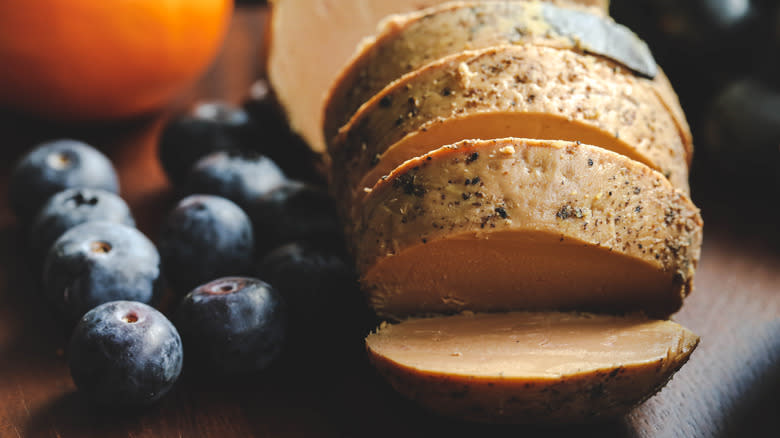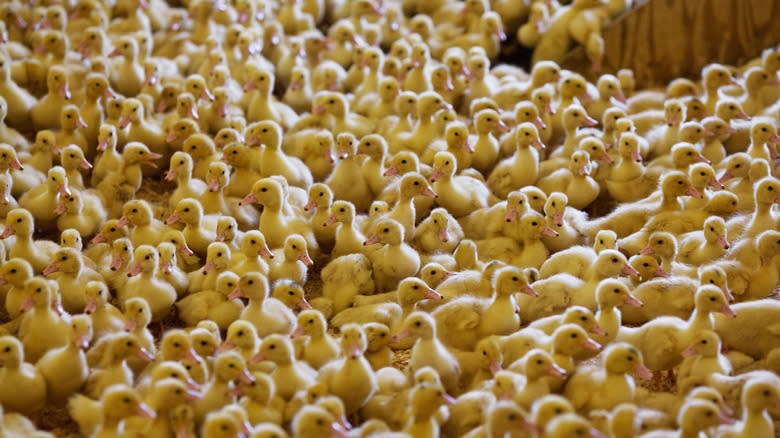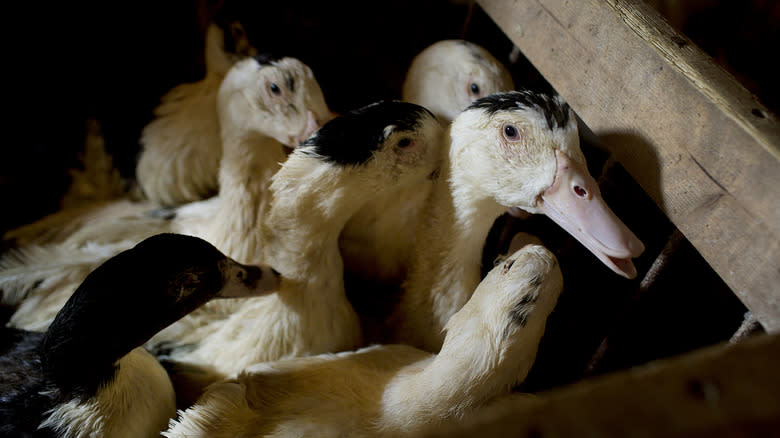It's Illegal To Produce Foie Gras In California. Here's Why

If you're not a native Californian (or current resident of the Golden State), you're probably not familiar with their stance on the controversial dish, foie gras. And let's face it -- even if you are a Californian, you probably aren't aware of its decades-long beef with the production and sale of duck and goose liver. As it turns out, foie gras is a touchy subject when it comes to California state legislature, which banned the food in 2004. By 2012, California residents were outlawed from either buying or producing foie gras in-state. Why? Because of animal welfare laws, or the lack thereof. The production of foie gras is considered to be cruel, and that's something that simply won't fly with California lawmakers.
Foie gras translates from French to "fatty liver" for a reason: Foie gras production involves force-feeding ducks and geese with an esophageal tube to the point of engorging its liver to be far larger than its normal size. The birds are usually farmed in inhumane conditions during their brief, excruciating lives. Most ducks and geese are slaughtered within 13 weeks of hatching -- a fraction of their natural 10-year life expectancy -- all while enduring skin infections and bone fractures due to the unsavory environments they're kept in.
Read more: French Cooking Tricks You Need In Your Life
U.S. Vs. California Animal Welfare Laws

It isn't only California that has banned the sale and production of foie gras. Many European countries have outlawed the pâté as well due to the cruelty of its production. However, foie gras currently remains legal in America's other 49 states, and there is an ongoing debate about the California ban being unconstitutional. In May of 2023, the Supreme Court was asked to weigh in on the law but refused, passing it off to the lower courts, where California won, as reported by CNN.
There are no federal welfare laws in place for farm animals or animals that are bred for consumption, per the U.S. Department of Agriculture. This means that these kinds of protections come down to the rulings of state legislators, and California enforces some of the only farmed animal welfare laws in the country. Only recently have issues of humane captivity been addressed, like the 2018 Farm Animal Confinement Initiative, which, as stated by the California Department of Food and Agriculture, prevents business owners and operators from patronizing producers that they know to be unethical in their farming practices.
For The Love Of A Loophole

There are efforts to produce foie gras more humanely: A Spanish producer has been cultivating wild geese for small-batch, "ethical" pâté. But it's unlikely that American foie gras farmers will be following suit, as this business model seems to be less lucrative for major producers. This is why companies like Hudson Valley Foie Gras were among the entities who attempted to get the Supreme Court to strike down California's foie gras ban.
That 2023 lawsuit wasn't the first time people have tried to go above California's head in the name of foie gras. In July of 2012, the year the ban was enacted, San Francisco's Presidio Social Club continued to sell foie gras to patrons, claiming that because the restaurant is situated on federally-owned land, they weren't obligated to adhere to state law. This stunt lasted less than a year after the ban was made effective, due to public pushback and animal rights activists protesting outside the restaurant. It's hard to believe that foie gras and its associated cruelty have been such a hot topic for 20 years now, but it seems that there won't be any rest in the fight for people's right to eat fatty liver for years to come.
Read the original article on Daily Meal.

